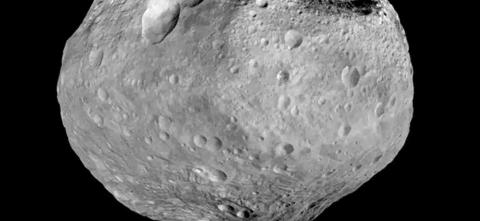
New Research Shatters Long-Held Beliefs About Asteroid Vesta
For decades, scientists believed Vesta, one of the largest objects in our solar system’s asteroid belt, wasn’t just an asteroid. They concluded that Vesta has a crust, mantle and core – fundamental properties of a planet. Michigan State University has contributed to research that flips this notion on its head.

MSU Greenhouse Facility Expands With New Headhouse, Renovations to Boost Capacity
Just over a year ago, Michigan State University leaders broke ground on transformative renovations taking place at the MSU Plant Science Research Greenhouse Facility. As work continues to be done at the facility, its progress is clear and evident when passing by.

MSU’s Supercomputer Celebrates 20 Years of Accelerating Research
The Institute for Cyber-Enabled Research (ICER) marked its 20th anniversary this February with a celebration at the MSU Union Ballroom, highlighting two decades of advancing high-performance computing (HPC) on campus. Event highlights included a poster session showcased impactful research enabled by MSU’s supercomputer.

KBS Pasture Dairy Center Wraps Up 15 Years of Innovation
Starting in 2009, the Pasture Dairy Center at the W.K. Kellogg Biological Station pioneered automatic robotic milking combined with data-driven intensive rotational grazing methods for dairy cattle. These robots remained operational for 15 years and were instrumental in informing the rapid adoption of robotic milking systems across Michigan.

Spartan Researchers Make Every Drop Count
College of Natural Science Assistant Professor Anthony Kendall and College of Engineering Associate Professor Annick Anctil are part of an interdisciplinary team. Together, with Kansas Geological Survey and Kansas State University, they created a system to increase groundwater and preserve aquifers by harnessing the power of solar panel arrays.

MSU Researchers Fight Cancer for You
From understanding the origins of cancer to engineering precision therapies, MSU scientists continue to push the boundaries of what’s possible in the fight against this disease.

Research for You
With support from the federal government, Spartan researchers have delivered lifesaving breakthroughs for generations and continue to tackle our most urgent challenges. From lifesaving cancer drugs that treat millions to advancements in agriculture that help deliver healthy food to the kitchen table, Spartan research makes life better.

MSU Salutes Breakthroughs in Innovation and Entrepreneurship at 2025 Innovation Celebration
Michigan State University’s Innovation Center hosted the highly anticipated 2025 Innovation Celebration on April 1 at the Kellogg Center, honoring the trailblazers advancing research, entrepreneurship, and economic development in the region and beyond.
Announcements
